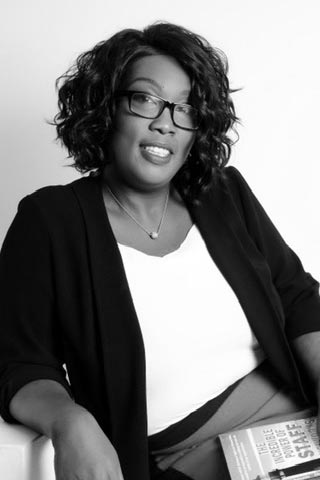Diversity Voices Interview: Cherron Inko-Tariah MBE - Author, Consultant, Coach & Facilitator
1. We keep hearing that organisations want to 'be better' at diversity and inclusion; based on your experience what are the first 3 key areas that an organisation should prioritise when setting out to improve their diversity and inclusion outcomes?
Interesting question. I think organisations need to be clear about 'why' they want to be better. What is driving this motivation? If it's because they want to be seen to do something - then I suggest they rethink.
However, if for example, they understand the multiple benefits of a more diverse and inclusive workforce, then they need to understand that it's not easy and must be prepared to dig in the inclusion mine. I read an article that said: "Mines are constantly changing. As the miners work, the tunnels may change and even the requirements for structural integrity can be shifted. Keeping everyone aware of what changes are being made is absolutely essential."
The same could be said about inclusion - as the organisation digs deeper for inclusion, the structure of the organisation may need to adapt to a new way of operating. Keeping employees engaged with opportunities to challenge and contribute is vital. How do organisations DIG?
Decide to act: Take an objective look at the organisation. How are people recruited, promoted, acknowledged etc? Who are the systems designed for? Are there any blockages in the pipeline? Are messages filtered?
Intentional about Change: Define what inclusion means for your organisation. What won't be tolerated? What will be applauded? How does it tie into your values, aim and mission? It has to be one of your core pillars and woven in to all areas - rather than a bolt on.
Glocally mindful: The world is getting smaller - who we work with and how we work is changing. Inclusive practices mean that the organisation is more agile, culturally competent and innovative with both a local and potentially global reach. Mining for inclusion means organisations need to be aware that the world is a recruitment ground and if they want the best to join then they need to create an environment where they thrive.
2. In your experience, is it still important for organisational leaders to take responsibility for visibly influencing and actively modelling the inclusive behaviours that they seek to embed in the organisations culture?
Absolutely they should. In addition to ensuring the senior leaders understand their role in modelling inclusive behaviours, it is also important to have people throughout the pipeline pushing the agenda too. This helps to embed and sustain beyond the personality of the organisational leader.
3. Cherron your belief in the power of staff networks to drive Diversity and Inclusion within organisations led you to write your powerful book "The Incredible Power Of Staff Networks", to set up a consultancy and more recently create a 'National Day for Staff Networks'…What is it that fuels your continued commitment and passion?
As a Chair of a Staff Network, a member once said to me: 'They who water, will always be watered.' This just resonated with me on a personal level and has stayed with me. There isn't just one thing that fuels my passion; it's a myriad of factors.
So for example, I love the coming together and forming of people prepared to put egos and hidden agenda aside and focus on one aim of improving outcomes and countering a negative narrative. There is something powerful about the intention of individuals to unify for change.
The other aspect that really pushes me is that when networks do things effectively, not only do their members benefit but so does the whole organisation. So networks are acting as shareholders of the business positioning themselves as key players in achieving the bottom line and creating an inclusive workspace. Albert Pine said: "What we do for ourselves dies with us. What we do for others and the world, is and remains immortal."
Finally, people are still the most valuable asset in the workplace and supply chain. The business with people at its heart will have the heart of the people (loyalty, productivity, engaged etc). So networks can act as the conscience of the organisation; helping to keep the heartbeat regular. Networks can encourage and be a provision of support; they can offer critical challenge to policy decisions and system procedures to create a 'cover free' wokplace, and help individuals navigate complex issues so that can feel comfortable in their own skin.
4. In your consultancy work, what would you say are some of the more frustrating challenges that you consistently face when working with organisations?
The most frustrating thing is the time it is taking to bring change. We know about the business case, the moral case and the legal case and yet some organisations are still dragging their feet on this issue and not grasping the fact that there organisation would be better off with inclusion intertwined with its values. Another thing that irks me is that for all the rhetoric and diverse photos on the website, there still is a huge gap with the reality. The experience of working in the organisation is not always a positive or nurturing one for certain groups and that needs to change. A systemic change is necessary which means stop looking for quick fixes and explore viable, and sustainable solutions. (I'll step off my soapbox)
5. As a leading D & I expert, what is the last thing that you learnt that challenged your thinking?
I'm mentoring a millennial at the moment. She explained that she's certainly experienced disadvantages and had been denied opportunities to progression. She wasn't despondent but rather determined - which I admire. I was challenged because she was half my age and yet some of the situations she was going through were ones that I recognised. This made me even more determined to press for progress and help make work better for the current and future workforce.


